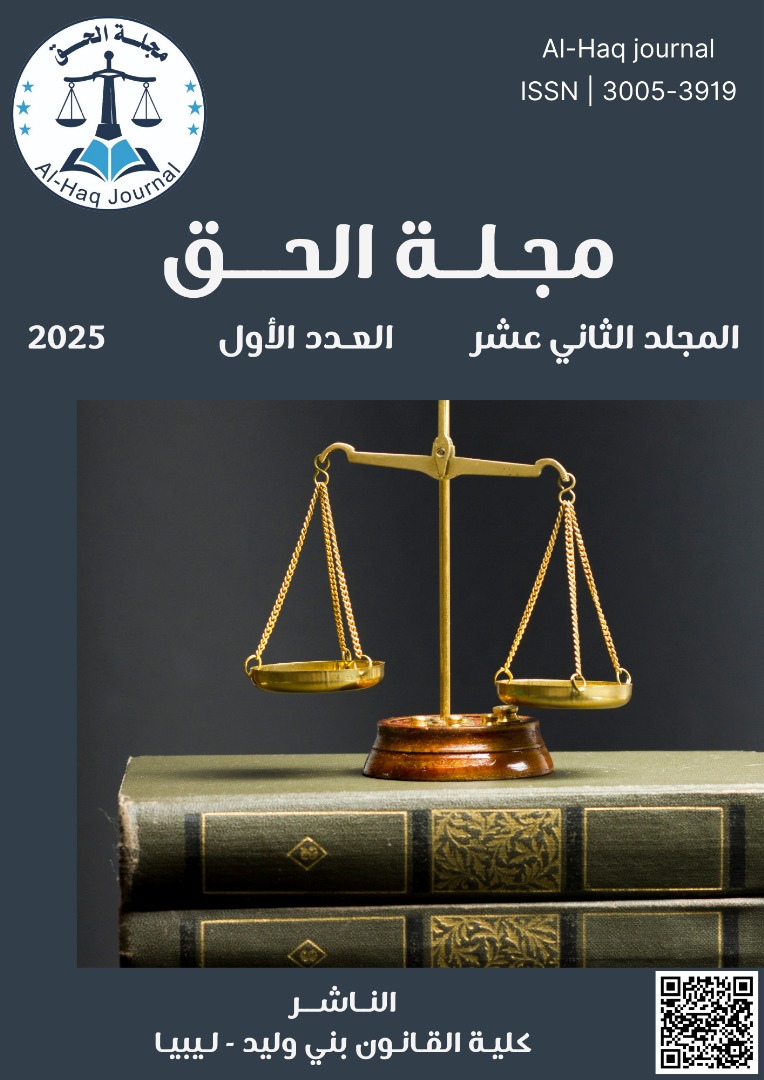Abdul Rahman Abdul Qader Abdul Nabi
DOI:
https://doi.org/10.58916/alhaq.v12i1.280Keywords:
statute of limitations – crime – lawsuit – effects – expiry.Abstract
Among the most significant crises facing criminal law is the issue of whether or not the statute of limitations exists. This statute of limitations is based on the notion that criminal prosecution is futile in punishing a crime after a certain period of time has passed from the date of the incident to the moment the criminal case is filed against the accused. In addition to the crisis of legal adaptation of the statute of limitations, the recognition of the importance of the statute of limitations and the trend towards its adoption in the criminal system profoundly raises the issue of its legal adaptation. The statute of limitations as a substantive rule has provisions and principles upon which it is based that differ from the provisions and principles of the statute of limitations as a procedural rule. The former is based on the fact that the statute of limitations is subject to the principle of substantive legality based on the idea of immediate effect, and that texts do not apply retroactively unless they are more beneficial to the accused, which is known as the statute of limitations that extinguishes the crime. Procedural statute of limitations, which is the reason for the expiration of the lawsuit, is based on the principle of procedural legality based on the fact that there is no criminal procedure except by law. This results in excluding the retroactive effect of the procedural text and resorting to the immediacy of these principles in determining the nature of the statute of limitations. Its importance is evident in its being the most effective means - if not the only one - that aims to find solutions to pending issues resulting from crimes committed under a law that stipulates the statute of limitations. As for criminal prosecution, it came after the adoption of Law No. 11 of 1997. Regarding the abolition of the statute of limitations.
Do the substantive provisions of the statute of limitations apply to such incidents, and does the crime lapse with the passage of time? Or do the procedural provisions of the statute of limitations apply, and does the crime not lapse with the passage of time? Considering that the criterion here is the date of the action, not the date of the incident.
Downloads
References
First: Books
Ahmed Fathi Sorour:
A Brief Introduction to the Criminal Procedure Law, Dar Al Nahda Al Arabiya, Cairo, Egypt, 1983.
An Intermediate Introduction to the Criminal Procedure Law, Dar Al Nahda Al Arabiya, Cairo, Egypt, 1981.
Constitutional Criminal Law, Dar Al Shorouk, Cairo, Egypt, 2006.
Al Hadi Ali Youssef Bu Hamra, A Brief Introduction to the Libyan Criminal Procedure Law, Tripoli International Scientific Library, 4th ed., Tripoli, Libya, 2022.
Hassan Sadiq Al Marsafawi, Principles of Criminal Procedure, Dar Manshaat Al Maaref, Egypt, 1961.
Raouf Abdel, Principles of Criminal Procedure in Egyptian Law, Nahdet Misr Press, 9th ed., Cairo, Egypt, 1972.
Essam Afifi Abdel Basir, The Principle of Criminal Legality: A Comparative Study, Dar Abu Al Majd Printing House, Cairo, Egypt, 2007.
Ali Zaki Al Arabi Bey, The Basic Principles of Criminal Investigations and Procedures, Al-E'timad Press, 1st ed., Vol. 1, Cairo, Egypt, 1923.
Awad Muhammad Awad, The Criminal Procedure Code in Libyan Legislation, University Publications House, Alexandria, Egypt, 2008.
Faiza Younis al-Basha, Commentary on the Abu Salim Prisoners' Case, National Library, Benghazi, Libya, 2020.
Fawzia Abd al-Sattar, Explanation of the Criminal Procedure Code, Cairo University Press, Dar al-Nahda al-Arabiya, Cairo, Egypt.
Mamoun Muhammad Salama, Criminal Procedure in Libyan Legislation, Dar al-Kutub Press, Vol. 1, 1st ed., Beirut, Lebanon, 1971.
Yassin Omar Youssef, A Comprehensive Explanation of Criminal Procedures, The General Theory of Evidence in Criminal Matters, Nasher Printing Company, 2015.
Second: Theses and Dissertations
Muhammad Awad Al-Ahwal, The Expiration of the State's Authority to Punish, PhD Thesis, Faculty of Law, Cairo University, Cairo, Egypt, 1964.
Third: Research and Articles
Al-Hadi Ali Youssef Bu Hamra:
Criminal Reforms with Quranic Directives, Dar Al-Fassasa Al-Ilmiyah, 1st ed., Benghazi, Libya, 2023.
A Brief Look at the Criminal Prosecution Through Its Functions, National Library, 1st ed., Benghazi, Libya, 2020.
Libyan Constitutional Issues, Tripoli International Library, Tripoli, Libya, 2019.
The Necessity of a Fair Trial, Legal Articles and Research, National Library, 1st ed., Benghazi, Libya, 2020.
Khaled Salem Falah, The Extent of the Statute of Limitations for War Crimes and Crimes Against Humanity, Commentary on the Supreme Court Ruling in Criminal Appeal No. 512/67 Q, in connection with the Abu Salim Prison Massacre Case.
Issa Al-Makhul, The Influence of the Philosophy of Criminal Thought on the Regulation of the Rules of the Statute of Limitations of Public Actions in Syrian and Comparative Legislation, Journal of Law, Vol. 11, No. 1.
Maher Ibrahim Obeid, The Extinction of Criminal Actions and Their Impact on the Stability of Legal Positions: A Comparative Study, Journal of Graduate Studies, University of Nilein, Vol. 13, No. 51, 2019.
Fourth: Legislation
The Libyan Penal Code of 1953.
The Libyan Code of Criminal Procedure of 1953.
The United Nations Convention on the Prevention of Statutory Limitations for War Crimes and Crimes Against Humanity.
Law No. (11) of 1997 Amending Certain Provisions of the Penal Code.
Law No. (31) of 2013 Concerning the Abu Salim Prison Incident.
Resolution No. (59) of 2013 regarding the Abu Salim prison incident.
Law No. (29) of 2013 regarding transitional justice.
Published
Issue
Section
License

This work is licensed under a Creative Commons Attribution-NonCommercial 4.0 International License.









